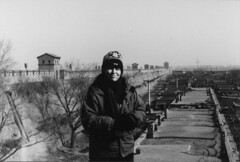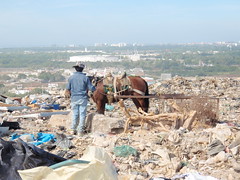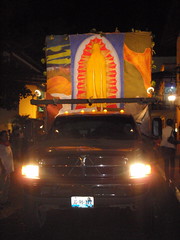Wednesday, December 31, 2008
Resolutions...
So, here's a couple in writing:
1. Finish draft of current WIP
2. Start new book - OR - finish Volume 3 of Overlong Unsellable Trilogy. Just because.
3. Keep exercising. More if possible. It's good for me.
4. Learn to cook a few more things (I have this cookbook for inspiration).
5. Figure out some way to sustain this more creative lifestyle.
That last one is the biggie, obviously. I have no clear idea how I'll accomplish it. Yet. I hope it comes to me.
I didn't put "sell my novel" because that part's out of my hands (and in better hands than mine). If the book does sell, I'll add "set up author website and promote my ass off" to the above list.
Anyone want to commit in writing to yours?
Evidence of my insanity...

Pingyao
Originally uploaded by Other Lisa
This is me in Pingyao a couple years ago, in the fleece-lined jacket mentioned in comments. You can see it gives me that wonderful "sausage" profile - I forget just how many layers I was wearing underneath. And it's going to be colder in Xinjiang...
WTF was I thinking?
This time, I'm trying to plan the whole thing in advance, because I'm figuring my usual travel planning method (stay up super late the night before I go and throw a bunch of crap in a bag) isn't a good strategy for a month-long trip involving a lot of train travel, cold and roughing it. And did I mention cold?
See, I'm planning on visiting a good friend of mine in Yili, Xinjiang. I've always wanted to go to Xinjiang. The Silk Road, and all that. I'm going to go to Kunming (a sort of pilgrimage to my past - I turned 21 there) and then I figured I'd take a train up to visit my friend, maybe stop in Kaifeng and places like that, just...because.
Okay, I just checked the average February temperature in Urumqi (closest marker to Yili). Um...it maybe gets up to 17 degrees. 17?! That's the name of a magazine, not a temperature!
So, I just ordered a pair of Sorel boots. Because my feet have gotten bigger, and I can't wear my lovely Mongolian padded boots any more. Dammit.
There's a whole story behind the Mongolian padded boots, but I'm too tired to post it now. And if anyone has any suggestions re: cold weather gear, please do let me know!
Monday, December 29, 2008
"Officials should shovel pig manure"
Rather than go into a full-on rant here about how much I loathe Sam Zell and what he's done to a paper that I subscribed to for over 20 years (it's late, and I've got writing to do), I'll just say that I'm surprised any good reporting goes on there at this point, and that Mark Magnier's latest feature on corruption in China is well-worth a look. Magnier's lengthy piece provides numerous examples of the systematic corruption that pervades all aspects of Chinese society:
Corruption is an everyday experience for millions of Chinese that taints not just schools, but relations in business, on farms and in factories, and potentially any contact citizens have with officialdom. Foshan appears no more corrupt than any other city in China, experts say. It is noteworthy only as an example of a pervasive problem that threatens China's stability and political system.I had a revelation of sorts the other night, that a part of my pessimism about this being the "Chinese Century" came from my own idealism - that a country with as large a population as China, where so many of its citizens were impoverished and exploited had too many internal problems to overcome to become the globe's major superpower. My realization was that perhaps the Chinese leadership only cared about its citizens' well-being to the extent necessary to keep them from open rebellion. That its export economy and subsidization of American debt at the expense of spreading the wealth internally were a part of a larger, long-range plan, to buy up enough foreign assets to ensure control in the future. I still think that may be true. But I also think that this strategy has its own risks. It's riding the tiger, a race to secure wealth before society collapses from the weight of its own contradictions.
Senior Communist Party officials know that decades of remarkable economic progress are at risk if graft and bribery stretch the chasm between the haves and have-nots too wide. But they have limited room to maneuver. Any meaningful effort to crack down endangers the party's monopoly on power.
The system depends on legions of police, local party and government officials to enforce Beijing's policies and quash dissent. All too often, critics say, local officials regard their position as a license to steal.
Throughout the country, the prodigious rate of economic growth has created a gold rush mentality. Absent both the strictures and the social safety network of Mao Tse-tung's rigid system, millions of people are seeking ways to prosper -- legally or illegally.
Corruption accounts for an estimated 3% to 15% of a $7-trillion economy, and party membership can be an invitation to solicit bribes or cut illegal land deals. Membership hit 74 million at the end of 2007, a 10% jump from 2002, as moneymaking opportunities increasingly trumped ideology.
Nearly 5,000 officials at the county level or above were punished for corruption over the last year, state media reported Friday.
"Of course everyone hates corruption," said Qiao Zhanxiang, a Beijing lawyer who took on the Ministry of Railways for alleged price gouging and lost. "But everyone also wants to be a part of it."
The result is a growing divide between those who benefit from corruption and their victims. It is at the grass-roots level where this chasm is most harshly felt, among those abused by the system, like Liao and Chen, or others who have simply been left behind.
"Common Chinese people are in hell," said Ai Xiaoming, a documentary film producer and professor at Zhongshan University in the neighboring city of Guangzhou. "Hell is not some future. It's right now."
After the widespread and grandiose scale of the abuses in the American financial system that have nearly ruined our economy, it's hard to get too self-righteous about the problem of corruption in China. But there are some important differences. Most of us in America experience American corruption in the abstract, or at a step removed. A lot of us could point to things that have happened in our lives as a consequence of wide-spread corruption - we can't get loans, maybe we've even lost our jobs, in part because of a chain of events kicked off by criminal greed. The difference is that most of us don't experience the corruption directly. In China, peoples' daily lives are afflicted by corruption at every turn. They can't depend on the validity of common transactions that most of us take for granted. This is one of the factors that I consider when I read or hear pundits predict the Chinese century. China will never become the predominant global power until it creates a society where ordinary Chinese people can have real faith that the social contract exists for them and that basic promises between individuals, between institutions, will be kept.
(Here's another article with a pessimistic view - or maybe optimistic, in that it posits the global economic crisis will lead to the downfall of China's one-party system).
(H/T to China Law Blog)
Sunday, December 28, 2008
Literature Map
I think tools like this are a part of what's been missing in the new publishing universe - creative ways of marketing and connecting books to their audiences. I'm excited to see sites like this starting to fill that gap.
Saturday, December 27, 2008
Bookmas!
Books Bought:
For my mom, my stepdad, my stepmom, my sister (don't tell her), my sister's boyfriend (don't tell him), my niece, three friends (that I can think of. I might have forgotten someone).
Books Received:
No physical books so far, but a gift card for my favorite local bookstore, Small World Books,, and, um, while I was in Small World Books, I bought myself a few things...
Tuesday, December 23, 2008
Happy Holidays!
I am not a religious person but I dearly enjoy this time of year and these little rituals that give substance to my life.
Happy Holidays! Joyous Solstice! Merry Christmas! Happy Hanukah! And a prosperous, creative New Year!
Wednesday, December 17, 2008
Tuesday, December 16, 2008
Department of Inexplicable Crimes...
According to the Hillsborough County Sheriff's Office, two men entered a man's home early Sunday and demanded his eggbeater. One suspect was holding a pistol while the other brandished a knife to the resident's neck.Oh, and this final detail:
Police found the eggbeater in the man's left pocket.I don't know, perhaps a compelling need for homemade eggnog?
Friday, December 12, 2008
Dump

For some reason, I wanted to visit the dump. I thought it might be a good location for my new novel in progress. I thought it might be interesting. Maybe I'm just one of those privileged Westerners engaging in poverty tourism. It's entirely possible.
Valeria has done some work at the dump, both as a volunteer and a performance artist. She graciously agreed to take me. But she couldn't get the necessary permit, even trying a few days in advance. The situation at the dump is complicated. It's scheduled to close, but delays in completing the new dump mean that the old one will remain open a little longer.
The dump is 28 years old. It began at a time when there were no real environmental regulations in Mexico, in a valley some distance from the town. Trash piled up in the valley until the valley filled; then the mountain rose above it. Gradually the town came as well. There are new apartments close to the dump, and a new university too.
We took a taxi out to the colonia that has grown up around the dump, stopping at a fruteria to buy a half a crate of oranges for the workers: the dump's employers and the recyclers who pay for the privilege of sorting through the garbage to scavenge things to sell. There is a hierarchy at the dump, with "bosses" controlling who gets what and for how much. "There was an old lady who used to be here," Valeria told me, "and she would wear a nice dress and gloves and look for perfume bottles." Some people live more or less on the dump, others around it, and they take their things to their scavenged shacks to sort and sell.
Since we didn't have official permission to visit, it would all be a matter of luck, Valeria explained. Or Valeria's charm, more accurately. The oranges didn't hurt either. I took some up to the workers spraying brown leachate out of green hoses into a pit. This is part of a system to filter the leachate and prevent it from leaking places it shouldn't (I wish I could describe the process more accurately, but my Spanish only goes so far). About five minutes after we arrived at the dusty gate, the manager arrived.
At first the manager didn't want to let us up there. He wanted to be assured that I wouldn't say anything bad about the dump. I promised I wouldn't, and that if he didn't want me to take photos, I would not.
He took us up in his pickup, on paths blocked at times with baby carriages and cracked tires, up to the top. The lower levels of the mountain have been covered with grass, which I believe is planted on top of a rubber membrane, again designed to seal off any contaminates from the dump. Once the manager determined that I was actually interested in how the dump worked, he explained it all to me. I understood most, but not all of what he had to say. What I did understand was his real passion and conscientiousness about his job, which was basically trying to retrofit a mountain of garbage so that the environment would be protected and the land eventually used for something else. But how? For years, the garbage had been sorted by hand; they have no real way of knowing what is buried there, how dangerous it might be. Methane gas accumulates; organic materials decompose into a viscous liquid that seeps wherever it can find a path.
The views from the top of the dump are pretty amazing. You can see the town, the marina, the new developments, the ocean. But the dump itself is what's really compelling.
Valeria told me that it had become a home for thousands of birds. She wasn't exaggerating. Flocks of buzzards, which I would expect, and white herons, which seem somewhat incongruous, come to the dump to feast on what's there. Things like: random cow parts: lips. Skulls. Hooves. Ears.
What there seems to be more of than anything are plastic bags. Plastic bags, faded by the sun, make up the slopes and summit of this mountain. The earth will not end in fire or ice or water. I am convinced we will all smother in plastic.
The surface of the mountain is spongy; it trembles when the bulldozers come close. I wish I could describe the smell. Rancid, sweet, rotting fruit, spoiled baby food, shit — none of that quite captures it.
The new dump will have all sorts of modern technology, the manager explained, and they are doing their best to cope with the problems that this one presents, but essentially, it is a matter of how do we bury our mistakes, when they are mistakes of this magnitude?
Meanwhile, the gleaners, the jovenes — all of the workers are jovenes, whether they are young, old, male or female, continue their labors: sorting through trash, through garbage, looking for things that they can sell. Cardboard. Bottles. Cans. Refrigerator parts. Copper wire. It's not much of a living; the price of recyclables has collapsed along with everything else in the current economic crisis.
Some day the dump will close, probably within the next few months. Maybe it will take longer. But the dump will be closed, sealed in rubber, covered over with grass. I'm not sure what happens to what's underneath. And I don't know if the birds will still come.
Saturday, December 06, 2008
Greetings from Vallarta!
In the meantime, research requires me to go down to the beach for a margarita.
Monday, December 01, 2008
Department of Obscure and Useless Skills
For some reason, however, the same thing does not apply to my throwing a football. I discovered this random and inexplicable skill several years ago, while at a barbecue and block party. My friends had a mini-football, and between guitar player Tony, athletic young teen son Joey and me, I could throw the thing the best. I mean, we are talking long, tight spirals here. It was weird.
When I was visiting my sis up in San Francisco, I took daily walks on Ocean Beach. On one clear day, there were three or four groups of people tossing a football around. I thought, hey, I want to toss a football around! I kept hoping one of them would fumble in my direction, but it didn't happen, and I am not the sort of person who would intrude on someone else's fun.
Today, I had to do some shopping at Target. I stopped in sporting goods to see if I could pick up a pair of 15 pound dumbbells. No luck. But there were shelves of footballs.
After some debate, I grabbed a Wilson Junior composite football, which is for ages 9 and up - I have really small hands. I tested it out in my backyard, gleefully throwing it into gates and bushes - and yeah, I can throw it pretty well. Though this is an utterly useless skill for a middle-aged woman, I might go back for the PeeWee model anyway.







